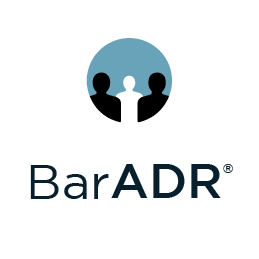
Alternative Dispute Resolution
What is ADR?
Alternative dispute resolution, or ADR, is an alternative to more formal, in-court litigation. ADR uses a neutral, third-party to help facilitate negotiations and bring a dispute to resolution through non-litigious, amicable and constructive means. The third-party does not typically advise on or determine the outcome of the issues being disputed; they assist the negotiation process and ensure good communication from start to finish.
Barristers have a professional duty to advise their clients, instructing solicitors and in-house counsel about any ADR alternatives to fully contested litigation that are reasonably available in each case.
Retain a barrister through BarADR
Barristers are specialists in legal advocacy in and out of the courtroom. They are uniquely qualified to act in and conduct alternative dispute resolution.
 BarADR provides solicitors, in-house counsel and members of the public with access to barristers who are specially trained and accredited in alternative dispute resolution. Our barrister ADR practitioners offer mediation, arbitration and expert determination, as well as adjudication, conciliation and other ADR services.
BarADR provides solicitors, in-house counsel and members of the public with access to barristers who are specially trained and accredited in alternative dispute resolution. Our barrister ADR practitioners offer mediation, arbitration and expert determination, as well as adjudication, conciliation and other ADR services.
Arbitration or mediation?
Arbitration and mediation are two distinct forms of alternative dispute resolution performed outside the courtroom. These two ADR processes offer unique benefits and applications.
Arbitration
Arbitration is designed to give the disputing parties a determinative ruling. The arbitrator leads the process as if it were a court proceeding by calling witnesses, entering evidence and, ultimately, ruling on the outcome of the case. This ruling is called an award.
Arbitrators are often court-appointed but may also be chosen and agreed upon by the disputing parties. A timeline is usually agreed to ensure the timely resolution of the arbitration.
Mediation
Mediation does not result in a ruling for the disputing parties. Instead, the mediator facilitates the negotiation and helps both parties develop potential options for resolution. Each party is given the opportunity to voice their concerns and share its side of the case. Mediation is used to preempt court proceedings and is often required by contracts.
Find a Barrister ADR Practitioner now through our Barrister ADR Practitioner Lists
ADR or court?
There are many advantages of choosing alternative dispute resolution methods over traditional courtroom litigation, from saving time and money, to achieving better outcomes and preserving relationships. ADR is often the better method to resolve a dispute. Barristers have a professional duty to inform their clients or instructing solicitors about any ADR alternatives to litigation that are reasonably available in each case.
Why choose ADR over litigation?
Alternative dispute resolution can:
- Save money: the cost of legal and court fees means that litigation can result in a financial loss even for the winning party. ADR can often save significant costs in the long-term.
- Save time: courtroom proceedings are generally protracted. ADR can offer a faster, more efficient path to resolution in most situations.
- Offer more control: clients have very little control over court proceedings once they have commenced. In ADR, you and your Barrister ADR Practitioner have more control and opportunities to direct the process.
- Offer confidentiality: court judgments are typically on the public record. In sensitive matters, ADR is a process that can ensure your dispute is kept confidential.
- Help preserve the relationship: while litigation is adversarial, ADR can ensure negotiations stay amicable, constructive and amenable to preserve the parties’ ongoing relationship.
- Offer neutral guidance: ADR may offer you an unbiased, third-party who can lead negotiations and steer you toward the best resolution.

 To top
To top